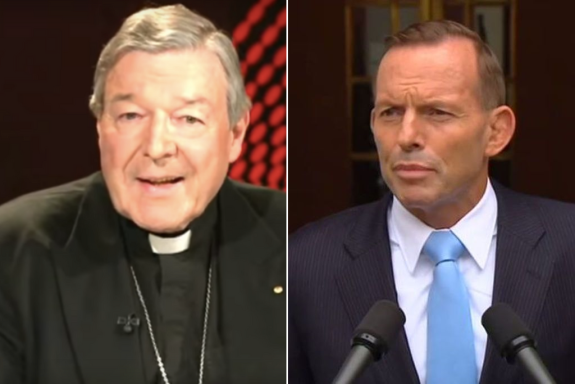Are we a secular state or a bunch of Pell pleasers?

According to Wikipedia, “a true secular state should steadfastly maintain national governance without influence from religious factions.”
Considering Australia is a supposedly secular state, religion plays not only an inordinate role in policies, it costs the taxpayer billions each year.
Charities are eligible for a range of tax concessions, including refunds of imputation credits, income tax exemptions, FBT and GST concessions.
To be a charity, all of your not-for-profit’s purposes must be charitable, except purposes that are ‘incidental or ancillary’ to (further or aid) the charitable purposes.
The law recognises many kinds of purposes as charitable.
The Charities Act 2013 (Cth) lists twelve charitable purposes:
- advancing health
- advancing education
- advancing social or public welfare
- advancing religion
- advancing culture
- promoting reconciliation, mutual respect and tolerance between groups of individuals that are in Australia
- promoting or protecting human rights
- advancing the security or safety of Australia or the Australian public
- preventing or relieving the suffering of animals
- advancing the natural environment
- promoting or opposing a change to any matter established by law, policy or practice in the Commonwealth, a state, a territory or another country, (where that change furthers or opposes one or more of the purposes above) and
- other similar purposes ‘beneficial to the general public’ (a general category).
According to a Herald/Nielsen poll conducted in the lead-up to the 2010 federal election, 84 per cent of people surveyed agreed with the statement ”religion and politics should be separate.”
More recently, a worldwide poll conducted by Win-Gallup International, found that 48 per cent of Australians said they were not religious; 10 per cent declared themselves “convinced atheists”; and 5 per cent did not know or did not respond. Only 37 per cent were religious. Yet the increasing influence and funding of religion in Australia persists.
Considering the vast array of differing beliefs and the disharmony that religion has caused throughout history, I fail to see how “advancing religion” is, in itself, “beneficial to the general public” when the majority of the public are not religious.
The Howard government outsourced a lot of social welfare to various religious organisations. By shifting a costly and complex social responsibility to religious providers, the government also exempts them from anti-discrimination laws. This is particularly evident with faith-based aged care providers that are free to discriminate against gays and lesbians on the sole basis that religious ethos overrides the principle of fair and equal treatment of all people. Faith-based schools can refuse entry to children on the basis of their religion, or lack thereof.
We also spend hundreds of millions on school chaplains for state schools. This appears in contradiction to the separation of church and state.
Australia is one of only three countries in the world where even the commercial enterprises of religious organisations are granted tax concessions. They are not required to report the breakdown of their charitable, business or investment activities.
Federally, these apply to income tax, fringe benefits tax, and the goods and services tax. State government exemptions cover land tax, payroll tax, stamp duties and car registration fees. Local governments provide exemptions from municipal rates. Concessions may also be granted for some water and power charges.
In 2008, the Secular Party of Australia made a submission to Treasury where they estimated the government’s financial assistance to religious institutions to be in the order of $31 billion annually.
They suggested that more accurate estimates of this kind could be obtained if the information was available, but it is not. It is standard budgetary procedure that the loss of revenue arising from exemptions, for example those applying to superannuation pensions, are listed in budget papers and can be quantified. It is anomalous that no such requirement exists for religious organisations, even those that may be involved in significant business and investment related activities.
Further anomalies occur in relation to the application of the Fringe Benefits Tax and the Goods and Services Tax. As the FBT is exempt to employees who are religious practitioners, eligible employers can provide remuneration packages that are biased wholly in terms of fringe benefits, thereby avoiding any income tax. This device can also create an unwarranted entitlement to social security benefits.
In relation to the GST, an anomaly occurs in relation to ceremonies for weddings and funerals. If performed by a civil celebrant, GST is payable, whereas if done in a church, it is not. Apart from being grossly inequitable, the situation is of doubtful legality in the light of equal opportunity laws that prohibit discrimination on the grounds of religion.
The SPA made the following recommendations in their 2008 submission:
- We submit that the definition of “charitable purpose” be reformed to exclude “advancement of religion”, which would reflect the modern view that religious worship and indoctrination into any sect, cult or religion are not charitable activities in themselves.
- We submit that the activities of any charitable organisation, religious or not, should not be exempt from accountability or from taxation.
- We submit that the investment and business related activities of any organisation should not be exempt from taxation.
- We submit that only the bona fide charitable activities not connected with religious worship or indoctrination should be tax exempt.
- We submit that a Charities Commission be established for the purposes of regulating and making accountable the charitable activities of all non-profit organisations. This should include religious organisations, and ensure that tax exemptions are provided only in relation to bona fide charitable activities, and are not used to disguise religious worship or indoctrination.
- We submit that all not-for-profit and religious organisations should be required to submit annual reports that are audited, and publicly available in a manner similar to that for public companies.
- We submit that if religious organisations receive tax exemptions, these must be provided only to the extent that their activities are bona fide charitable. Where an organisation is involved in religious worship and indoctrination, their business activities, investment income and other taxable activities should be separated, either through an accounting division or through operational separation.
In 2012, the Australian Charities and Not-for-Profits Commission (ACNC) was established largely as a result of a 2010 Productivity Commission report that criticised the existing regulatory regime, in which charities were overseen by a combination of ATO, ASIC, and the states, as cost-inefficient and unnecessarily complex. Moreover, the Productivity Commission deemed the preexisting system as insufficient for ensuring transparency in the allocation of funds by charities.
In 2013, Pro Bono Australia, an independent information agency for the sector, conducted a survey of 1500 non-profits. The survey found that 80% of respondents supported the ACNC. Despite this, the Coalition will move this year to abolish it and hand its functions over to the ATO.
Why would they ignore the overwhelming support from the NFP sector for the ACNC?
Fairfax Media reported that the Coalition’s plans to abolish the charity regulator, the ACNC, was in part due to “the lobbying power of church conservatives, the Catholic Church in particular, and the office of Sydney Cardinal George Pell, more particularly still.”
Perhaps unsurprisingly, the links to articles in the Age and the SMH about that story no longer work.
However another faith-based Not for Profit, St Vincent de Paul Society National Council has called on the Federal Government to abandon its ideological opposition to the ACNC.
“Rather than abolishing the ACNC, the Government would be well-advised to listen to the voices of the charitable and Not for Profit sector,” Chief Executive Dr John Falzon said. “The ACNC has built excellent relationships with the community sector in an effort to move towards a more supportive and less burdensome regulatory system. We are astonished to see the Government showing such strident opposition to the very sensible role of the ACNC.”
Community Council for Australia Chief Executive Officer David Crosbie said that a very broad range of people, other than some groups in the Catholic community, had shown support for the ACNC.
“For a long time people have been talking about the Not-for-Profit sector needing to have a voice and I think that yesterday it had a voice,” Crosbie said. “That can only be a benefit to the sector and that level of attention to our issues can only benefit the sector.”
“This is the kind of repeal you have when you don’t know what to do. The focus of this bill is solely to get rid of the ACNC. There’s no real plan, no real narrative or vision for what will happen when the ACNC is disbanded.”
Watch for a reintroduction of gag clauses to stop NFPs speaking out about funding cuts, banned by Federal Labor in 2013 but alive and well in Queensland and NSW. Talk and we cut your funding.
This is now in the hands of SS Commandant Morrison who will no doubt ban all scrutiny, accountability or transparency citing “on-god operations”.
George Pell will be well-pleased.
Like what we do at The AIMN?
You’ll like it even more knowing that your donation will help us to keep up the good fight.
Chuck in a few bucks and see just how far it goes!
Your contribution to help with the running costs of this site will be gratefully accepted.
You can donate through PayPal or credit card via the button below, or donate via bank transfer: BSB: 062500; A/c no: 10495969










